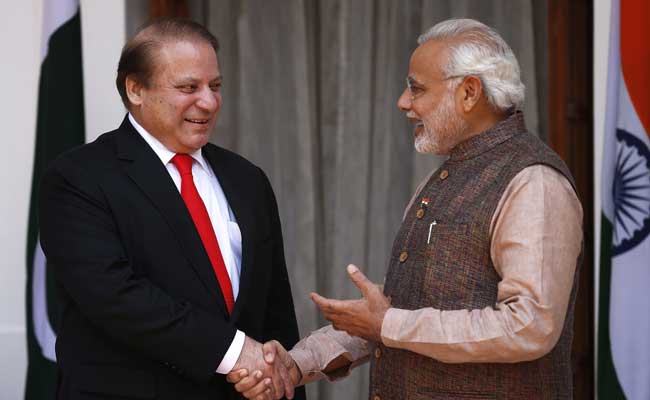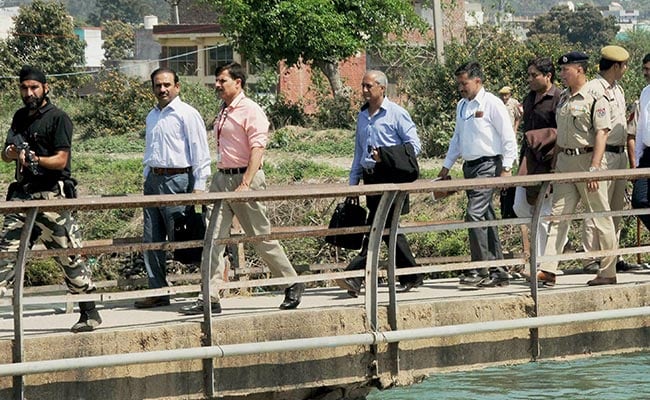Even the fact that the Pakistani establishment (read, its all-powerful Army and intelligence agencies) is now trying to trash the JIT visit to Pathankot is not really new. After all, no one in Delhi seriously expected Rawalpindi (where the Pakistani army and ISI headquarters are located, a few kms away from the capital in Islamabad) to reciprocate the compliment by giving an Indian team access to Masood Azhar, the head of the Jaish-e-Mohammed terror group which Delhi believes masterminded the Pathankot attack.
The fact remains that Pakistani army chief Raheel Sharif continues to run Pakistan's India policy (as well as other important relationships like Afghanistan, China and the US), notwithstanding Pakistani Prime Minister Nawaz Sharif's firm and unwavering belief that Pakistan has no option but to improve ties with its large neighbor, India.
So when Prime Minister Narendra Modi "dropped in" on Christmas at Raiwind, Nawaz Sharif's home just outside Lahore, to wish him on his grand-daughter's wedding, the alarm bells must have rung loud and strong in Rawalpindi. The incredible truth - which any casual visitor to Lahore will strongly vouch for - is that despite 70 years and several degrees of separation, the ordinary Pakistani citizen craves the return of normalcy with its "hamsaaya mulk" or "fellow nation", meaning India.
The conspiracy theorist will point out that the Pathankot attacks may have been an attempt at sabotaging Nawaz Sharif and Modi's fresh exertion of peace. While the seriously seditious analyst - and there are a few on both sides of the border - has come to the conclusion that the horrendous blasts in Lahore's Gulshan-i-Iqbal park on Easter were aimed at not only destabilizing the Sharifs (Nawaz's brother Shahbaz is the Chief Minister of Pakistan Punjab), but also so weakening the Pakistani PM that he becomes an ineffectual interlocutor with Modi's India.

Prime Minister Narendra Modi with his Pakistani counterpart Nawaz Sharif in New Delhi in May 2014 (AP photo)
By leaking a story of Indian engineers overhauling the Sharif family-owned sugar business, it is clear that the Pakistani establishment is aiming to paint the Prime Minister and his family as being easy on Indians. From there, it's a short haul to pointing out, as the Pakistan Today newspaper did this week, that "the JIT report has concluded that the Indian authorities had "prior information about the attackers" and that India used the attack as a tool to expand its "vicious propaganda" against Pakistan "without having any solid evidence to back the claim".
Predictably, Indian government sources were acerbic in their reaction, pointing out that the JIT had actually collected evidence in Pathankot in accordance with a Pakistani law which applies to Pakistani citizens committing offences abroad.

A five-member team from Pakistan visited the Pathankot air base that was attacked by terrorists in January this year (PTI photo)
So what is the Pakistan Today report trying to do today? Remember, the story has been leaked in the wake of the capture of alleged Indian spy Kulbhushan Yadav, who has been accused of trying to destabilize Balochistan. It is clear that Pakistan's security agencies are trying to build a case of moral equivalence between the Mumbai attacks and between Kulbhushan Yadav's alleged misdeeds on the one hand, and on the other trying to show that the Nawaz Sharif family continues to hire and break bread with Indian engineers.
This blatant attempt at undermining Pakistan's elected Prime Minister has been underscored in two important ways. First, the Pakistan army's amazing successes with its Zarb-e-Azb operations in the Waziristan region against the Taliban (despite the fact that thousands of civilians have been killed in collateral damage) has shown to the people that the Army has the capacity and willingness to go after terrorists. Second, the naming of the Nawaz Sharif family in the Panama Papers gives credence to the belief that the fabulously rich Sharifs don't think twice before parking some of their wealth in offshore accounts.
Meanwhile, the omnipresent noise in the India-Pakistan relationship continues. Pakistan High Commissioner to India Abdul Basit was at first quoted as saying on Thursday that the bilateral peace process was suspended, except that it turned out later that he never meant what he said. As for Aam Aadmi Party leader Arvind Kejriwal and the Congress' Anand Sharma, attacking Modi on his Pakistan policy seems par for the course, especially since elections in Punjab are less than a year away.
The truth is that Modi has already won the first round in this particular chess game between The People Vs the Generals. By risking a complete about-turn in his own and the RSS belief that Pakistan is the "enemy", which is to pursue an opening-up between the two nations, the Prime Minister must now take the long view. If he were to unilaterally open up trade and travel links over the next few months before he attends the SAARC summit in Islamabad in November, he will have succeeded in up-ending the Generals at their own game.
(Jyoti Malhotra has been a journalist for several years and retains an especial passion for dialogue and debate across South Asia.)
Disclaimer: The opinions expressed within this article are the personal opinions of the author. The facts and opinions appearing in the article do not reflect the views of NDTV and NDTV does not assume any responsibility or liability for the same.


